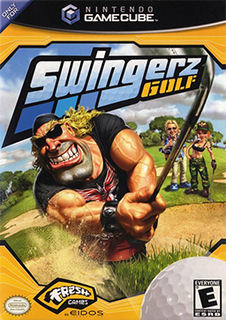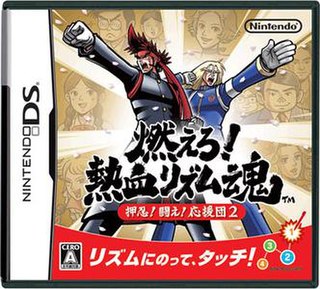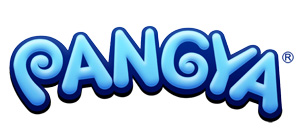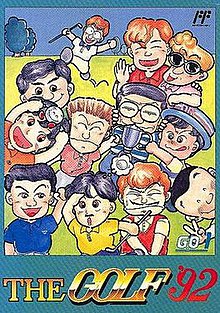Dance Dance Revolution (DDR), also known as Dancing Stage in earlier games in Europe, Central Asia, Middle East, Africa, South Asia and Oceania, and also some other games in Japan, is a music video game series produced by Konami. Introduced in Japan in 1998 as part of the Bemani series, and released in North America and Europe in 1999, Dance Dance Revolution is the pioneering series of the rhythm and dance genre in video games. Players stand on a "dance platform" or stage and hit colored arrows laid out in a cross with their feet to musical and visual cues. Players are judged by how well they time their dance to the patterns presented to them and are allowed to choose more music to play to if they receive a passing score.

Super Mario Bros.: The Lost Levels is a 1986 side-scrolling platform game developed and published by Nintendo as the first sequel to their 1985 bestseller Super Mario Bros. The games are similar in style and gameplay, apart from a steep increase in difficulty. Like the original, Mario or Luigi venture to rescue the Princess from Bowser. Unlike the original, the game has no two-player option and Luigi is differentiated from his twin plumber brother with reduced ground friction and increased jump height. The Lost Levels also introduces setbacks such as poison mushroom power-ups, counterproductive level warps, and mid-air wind gusts. The game has 32 levels across eight worlds, and five bonus worlds, each of which also has four levels.

Mario Golf: Toadstool Tour, known in Japan as Mario Golf: Family Tour, is a 2003 sports game developed by Camelot Software Planning and published by Nintendo for the Nintendo GameCube. It is the sequel to the 1999 Nintendo 64 title Mario Golf, and is the second game in the Mario Golf series. It was released in North America on July 28, 2003, in Japan on September 5, 2003, and in the PAL region in 2004.

Super Monkey Ball is a 2001 platform party video game developed by Amusement Vision and published by Sega. The game debuted in Japan at the 2001 Amusement Operators Union trade show as Monkey Ball, an arcade cabinet running on Sega's NAOMI hardware and controlled with a distinctive banana-shaped analog stick. Due to the failure of Sega's Dreamcast home console and the company's subsequent restructuring, an enhanced port dubbed Super Monkey Ball was released as a launch title for the GameCube in late 2001, garnering interest as Sega's first game published for a Nintendo home console.

Daigasso! Band Brothers is a music video game published and developed by Nintendo for the Nintendo DS handheld game console. It was released in Japan on December 2, 2004 as a launch game for the Nintendo DS. The game features multiple songs, which include classical music, television themes, and video game music. The game is controlled using both the buttons on the DS as well as its touch screen in certain portions. It uses a variety of different instruments, which are combined selectively in order to compose a song. Besides the primary mode, players may play together, each one playing a different instrument in the song. Players may also compose their own songs. It was to be released in the United States as Jam with the Band, but was never released nor formally cancelled. It has a sequel titled Jam with the Band, which was released in Japan in 2008 and in Europe in 2010.

True Swing Golf is a golf video game by long-time golf game creators T&E Soft, published by Nintendo and released for the Nintendo DS handheld video game system.

Mario Golf: Advance Tour, known in Japan as Mario Golf: GBA Tour, is a role-playing video game-styled sports game developed by Camelot Software Planning and published by Nintendo for the Game Boy Advance in 2004. The game is the sequel to the Game Boy Color version of Mario Golf.
Everybody's Golf , formerly known in North America as Hot Shots Golf, is a series of golf games published by Sony for the PlayStation series of video game consoles. The series is well known for its humorous take on the game of golf which includes cartoon-like characters and with modes such as miniature golf paired with a realistic engine and precise ball physics.

Resident Evil Outbreak: File #2, released in Japan as Biohazard Outbreak: File 2, is a stand-alone expansion to the original Resident Evil Outbreak. It was released for the PlayStation 2 in Japan on September 9, 2004; North America on April 26, 2005; and Europe on August 26, 2005.

Urban golf is a game, derived from the original game of golf, in which individual players or teams hit a ball into a hole or at a specified target using various clubs. Urban golf is any form of golf played without a traditional golf course.

Shot Online is a massive multiplayer online golf video game which also features character development and MMORPG elements. It is developed by the Seoul-based game developer WebzenOnNet Co. Ltd., and published by Webzen under their game portal website, GamesCampus. Although there is no subscription fee or cost to download and play the game, the game offers upgraded "Gold" membership plans for a monthly fee, and additional items may be purchased using real currency through the game's website.
Neo Turf Masters is a golf video game by Nazca for the Neo Geo, released in 1996. This is also one of the first two titles by Nazca, the other being the popular Metal Slug before & between being acquired by SNK.

Swingerz Golf is a sports video game released by Telenet Japan in 2002. It is a golf simulation game that allows the player to choose from 14 different characters, each with different strengths and weaknesses, to play on any of the game's 6 courses, varying greatly in difficulty and atmosphere. Along with normal match and stroke modes of play, the game offers a tour mode, which simulates the career of a chosen character, a mission mode, consisting of a series of challenges that gradually increase in difficulty, and minigames, including a sudden death style of gameplay and a near-pin style of gameplay.

Moero! Nekketsu Rhythm Damashii: Osu! Tatakae! Ouendan 2 is a rhythm video game developed by iNiS and published by Nintendo for the Nintendo DS handheld video game console. It is the third game to use its gameplay, and is the sequel to Osu! Tatakae! Ouendan while incorporating many of the improvements in gameplay made in Elite Beat Agents. The game has 4-player wireless play, supports the Nintendo DS Rumble Pak accessory, and was released in Japan on May 17, 2007.

Arnold Palmer Tournament Golf is a golf video game for the Sega "Genesis" or "MegaDrive".

Golf is a club-and-ball sport in which players use various clubs to hit balls into a series of holes on a course in as few strokes as possible.

PangYa, was an online multiplayer casual golf simulation game designed by Korean development company, Ntreev Soft and NCSOFT.

HAL's Hole in One Golf, known in Japan as Jumbo Ozaki no Hole In One, is a Super NES video game that was released in 1991.

Scooby-Doo and the Cyber Chase is a Scooby-Doo video game based on the Warner Brothers film Scooby-Doo and the Cyber Chase. The game was released for the PlayStation and Game Boy Advance in 2001. The PlayStation version became a "Greatest Hits" title in 2003.

Gradius III is a 1989 scrolling shooter video game developed and published by Konami, originally released for the arcades in Japan and other parts of Asia on December 11, 1989. It is the third game in the Gradius series. The game was ported to the Super Nintendo Entertainment System in Japan in 1990 and North America in 1991, and served as a launch title for the system in North America. The arcade version was included with Gradius IV in a two-in-one compilation for the PlayStation 2 and in the Gradius Collection for the PlayStation Portable.




















